Hades 2 review - standing on the shoulders of Supergiants
It's about Time.

In Hades, we meet Sisyphus, the once founder and king of Ephyra, now relegated to the underworld and tasked with pushing a boulder up a hill for eternity because he dared incur the wrath of Zeus. He's an unlikely ally; a cheerful chap seemingly content with his perpetual lot, keen to dish out advice, boons, and the odd joke. Sisyphus is a suitable parallel for Zagreus, in the first game: his task may be endless, but he can find the fun in it - no matter how many times the boulder rolls down the hill, he rolls up his sleeves and takes on the challenge once more with feeling.
Did Supergiant mean to make this peculiarly chipper version of Sisyphus such a potent (if not downright obvious) metaphor for the roguelike genre? Maybe. But, then, who would the mythical mascot for the second game be? Could it be Arachne, the silk-loving spider that embodies a cautionary tale about hubris: a warning to you to know and respect your limits. Or maybe it's Prometheus, the doomed Titan lionised for his defiance of the gods and the hero of human civilisation, who dared to steal fire from the peaks of Mount Olympus. His is a tale about the dangers of over-reaching, of inviting unintended consequence, a Socratic fable about, effectively, knowing your place.
But I think the most accurate Greek metaphor for Hades 2 doesn't actually appear in the game. I think it's the ship of Theseus (and, no, I'm not talking about a fan fiction romance between the first game's third boss and his bovine companion). Supergiant has never made a sequel before, and I don't envy the task of following one of the most beloved roguelikes ever made. Especially not when there is so much history, mythology, lore, and technical expertise woven through it. But there's the thing: Hades 2 somehow feels almost exactly like the original, yet all the parts are new. Everything seems the same, but nothing actually is… it's a philosophical quandary.
The formula will be immediately visible for anyone that's even flirted with the 2020 original. You play as Melinoë - a fleet-footed, often verbal hero with a single-minded ambition - and must fight through various realms in order to get to the game's new big bad, Chronos, the Titan of Time. En route, you will meet a supporting cast of intriguing and unexpected individuals all plucked from the annals of Greek myth. Some will help you, either with boons that modify your powers, or with items that beef you up, and others will hinder you through boss fights, gauntlets, and some other interactive surprises that I'm not going to spoil here.
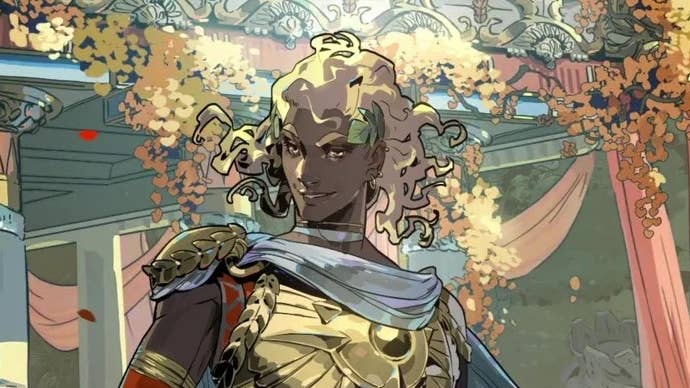
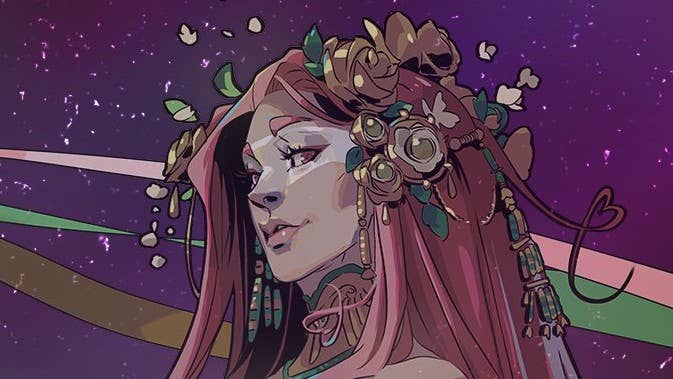
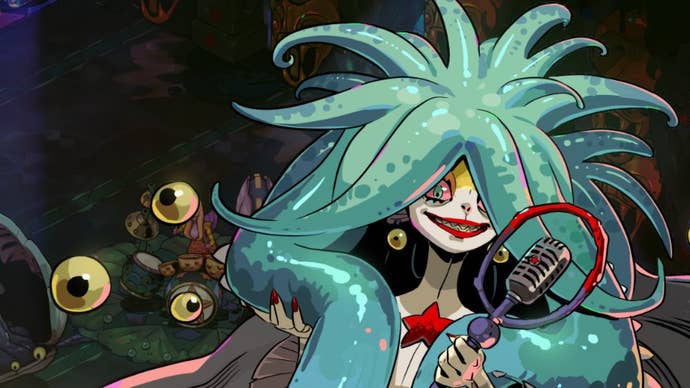
So far, so Hades. But it's in the minutiae that Melinoë sets herself apart from her hot-headed brother. Zagreus was full of angst, a (sort of) teenage rebel who wanted to break out of his family home and take his fate into his hands. He was rash, forthright, often lacking in discretion. Melinoë is almost the exact opposite; a young woman who has had her fate set for her, whose fight is born of urgent necessity rather than spunky retaliation. She is a touch cooler, and this comes through in how you play. Where Zagreus would dive headfirst into combat and hack and slash his way to victory in a frantic buzz of attrition, Melinoë is more considered and cerebral.
As a child, Melinoë was taken in by Hecate, the witch of the Crossroads. Our young heroine was trained by the witch and now has power similar to Zagreus, whilst also being emboldened by the threads of the occult. As well as a spectral hand that allows her to channel magic in a Tarot system that layers a sublime build-crafting deck on top her physical arsenal, Melinoë can also channel her mana into Omega attacks - charge-based moves supported by a metered resource that makes you think more carefully about positioning, timing, and tactics in the heat of battle.
It's remarkable how successful these mechanical differences are in characterising Melinoë. I struggled with my early Hades 2 runs, because I'm so used to role-playing Zagreus who - in my head - is a 'rushdown' character. Get in, deal absurd damage as quickly as possible, get out. Because that's who he is. At first, Melinoë felt squishier - she's a mage, after all - and I found myself perishing more often in Erebus and beyond than I ever did in Tartarus or Asphodel. But then I learned to think like Melinoë: keep it cool, use my cast to slow enemies down, charge up my attacks and dispatch foes with cold arithmetic rather than blind rage. Her mana tops up between rooms, and once you learn that, you understand the balance Supergiant has imbued in this game. Use your resources, take your time, watch your footing.
When you've started to internalise the fundamentals, you can get to work on the fun stuff. Figuring out which Gods' boons are going to be the crux of your run is the first task; your wand will benefit from special attack bonuses, whilst an unlockable axe demands buffs to its basic combo attack. Some weapons - a living skull that's also secretly a massive bomb - demand you pay attention to your cast, since it immobilises enemies and sets them up as cannon fodder whilst you're given space to move around and avoid hazards. Rhyming weapon upgrades with Boon empowerments, and weighing up whether you want to layer in a 'Hex' (think special moves in a fighting game) means that your on-the-fly decision-making is more important than ever, and one wrong choice has the potential to undermine your entire build.
OK, now it's making sense. Suddenly, I'm winning runs, progressing the plot, and starting to see more strands of this grand tapestry weave together. There's more to piece together here than there was in Hades: the sequel expands both horizontally and vertically, with pretty much every NPC having their own precious little side-story, and a much more pressurised central narrative framing nearly every interaction you have. From the machinations and uneasy alliances born in the Crossroads hub to the one-way messages sent from the Gods on high, Supergiant's writing remains best-in-class. There simply aren't other roguelikes that do it like this. It's epic, in the truest sense of the word: as much a reinterpretation and retelling of Greek myth as it is an homage. That the studio can consistently match that writing with the appropriate level of direction to its voice cast is a miracle, frankly. I assumed Hades was lightning in a bottle, but Hades 2 proves me incorrect.
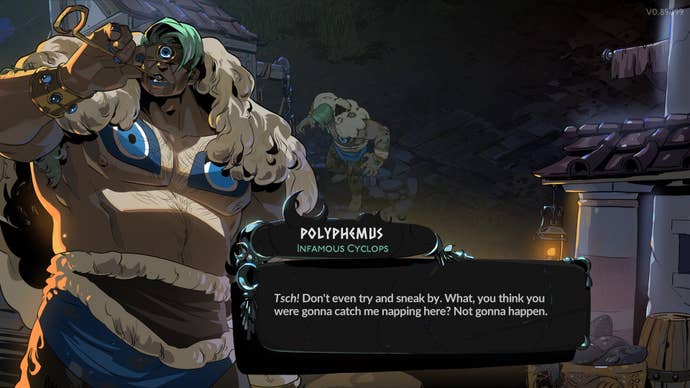
An irritation I have with roguelikes - from Enter the Gungeon to Binding of Isaac and everything in between - is the fatigue of repetition. The Sisyphean task of pushing the boulder up the hill is fun, but sometimes (maybe after a spectacularly unlucky single room in an otherwise good run), your enthusiasm can wane. Usually, that's because you know that boss or that room is waiting for you, some 30 minutes down the line. So, Hades 2 says, take a break. Instead of going down to fight Chronos, why not go up to visit your family on Mount Olympus? Of course, it's not that simple - legions of the dead stand between you and your goal - but by effectively doubling the size of the action-packed part of the game, Supergiant kills two birds with one stone: it gives you more to do whilst also letting you take a breather.
It sounds so simple, but these two distinct paths have their own bosses, their own enemies, their own storylines and - in some cases - their own specific boons. My experience of the game even had certain characters insisting I spent more time in a certain location, whilst resource rewards and my own dedication to build-crafting dragged me into another. It's roguelike catnip: if Supergiant took the genre formula and squared it in Hades, it now feels cubed in Hades 2.
I think Melinoë's trials are harder than Zagreus' ever were, too. But then there are more options available to our new sibling because of her upbringing, the size of the playground she gets to experiment with, and the confidence Supergiant has in its players. I resent dying less, because I know there's more for me to do in my downtime. I feel more rewarded by the runs that are cut short. I always feel like I have momentum, even if my early boons are a bit pathetic. I can't put this game down.

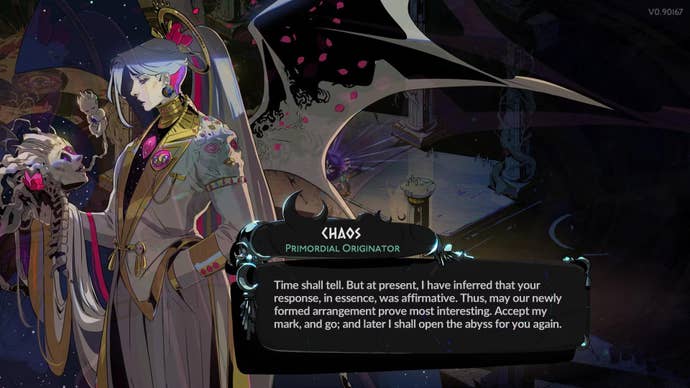
Amorous natures must run in the family, because Melinoë is almost as dedicated to fostering relationships as she is to unseating Chronos. Gifting, chatting, and flirting work much the same as before - but with that trademark Hades 2 depth bolted on - and there are a few new ways to interact with your romantic interests in the Crossroads than the House of Hades had room for. You can tend to a garden (that must be your inner Persephone coming out), recruit animal familiars that follow you into fights, or spar with Schelemeus (nee Skelly) to get to grips with any new weapons you may have unlocked. You can sing a duet with Artemis. You can hang out in a bar. You can pick up litter dropped by one of your less considerate allies. You can just ogle the gorgeous scenery, or listen to a gently snoring Hypnos as he sways in a hammock.
There are so many tiny elements of Hades 2 I want to shout about here. One of the most notable achievements in all of Supergiant's games has been how music interacts with the experience: whether it's Bastion, Pyre, Transistor or Hades, in-house composer artisan Darren Korb has always made sure the aural experience is as important as the visual one. Not only does Hades 2 live up to that, but it's another avenue Supergiant has to breadcrumb you into the world. One boss is a musical fight - impressive enough on its own - but slaying certain enemies affects the music: sometimes, you'll be using your sickles to slash away at just the drummer as the bass and vocals disappear. Other times, you'll be fighting a cappella. And hearing the sweet siren song as you descend into the depths, getting clearer and louder with each room you pass through? Just one instance of the small but deliciously hand-crafted details that's packed into every single second of the Hades 2 experience. I'm pretty certain the lyrics to the song change depending on your actions up to that point, too: I dread to think what the development flowchart for this feat looked like, but the results are incredible.
I've pushed past the credits and am onto the hunt for the 'true' ending, now, and I am still being surprised by what can still be found tucked into the creases and folds of Hades 2. Supergiant's visionary approach to storytelling and roguelike design has not suffered at all from the success of Hades: it merely emboldened it. That the studio can still dole out the surprises after how rich and textural Hades was, and that I still find myself floored by the ambition, the detail, the art, the technical prowess, and the willingness to cede control to players some 60-plus hours in is miraculous. Maybe it's witchcraft. Maybe it's magic. Either way, it's epic.
A copy of Hades 2 was provided for this review by Supergiant.








